Abstract
The purpose of the research was to analyse the digital competence of compulsory general education teachers and to create a model for improving functional literacy of all parties in educational relations. The paper covers the major steps of an experimental study aimed at diagnosing the initial level of digital literacy of teachers specialised in life and human sciences. The framework of the research involved four steps. Step one was to analyse the results of the scientific and methodological search for the components of the competence. Step two was to list the indicators to diagnose the relevant competencies. Step three was to process the data received from respondents, to visualise and to define the digital skills level. As the final step, the main conclusions were made based on the results of the study, and the ways to improve the efficiency of the teachers' digital competence were suggested. The main conclusions include: 1) the following digital skills of digital competence were defined:; 2) information and communication technologies are the basis for the digital competence formation, but these concepts are not identical; 3) the level of digital skills mastery does not depend on the subject taught; 4) the methodology for achieving the subject learning outcomes requires the development of key principles of digital didactic tools mastery.
Keywords: Digital environment, digital competence, educational content, media resources
Introduction
The modern learning space is developing exponentially, while geopolitical and internal challenges are creating conditions for updating the established paradigm of pedagogical science. One of the key characteristics of the Russian education system is digital transformation, which is accompanied by the emergence and development of new job functions of teachers at all levels of education.
The relevance of the digital competence of a modern teacher within the digital educational environment is determined by several factors: systematic improvement of professional competencies, need for continuing education; globalisation of the information flow; efficiency monitoring of motivational tools for the subjects studied; higher competitiveness in the pedagogical community.
The empirical data is based on the express monitoring of 250 compulsory general education teachers of the Yelets city district, Lipetsk region (Russian Federation).
Pedagogical science and practice has already covered a wide range of research related to a higher competence level of a modern teacher. A number of researchers (Babaev et al., 2020; Gryaznov, 2021) believe that the professional performance of a teacher is directly related to the application of digital technologies that become the object of scientific research.
The issues related to the digital transformation of education are covered in the studies that examine the impact of organisational, economic and socio-pedagogical conditions on the digitalisation of the educational environment (Krylova et al., 2019), information and communication competence of students (Avdeeva et al., 2022), digital competencies of higher school teachers (Pesha, 2022), teachers as participants in the educational relations from the point of view of the management of the Russian schools (Deryabin et al., 2021). All this testifies to the undoubted relevance of the study of digital competence and literacy of teachers in the present-day conditions. Although there is a number of studies devoted to the research topic, the current paper makes it possible to conclude that “ideas about many important axes of digital competencies” haven't been comprehensively described yet (Deryabin et al., 2021, p. 213).
Domestic studies published in recent years revealed the following:
- conditions for the effective use of digital educational resources in the compulsory general education process; the need to use digital educational resources in teaching schoolchildren and the emergence of the resulting difficulties; possible ways to create favourable conditions for the efficient use of digital educational resources in educational institutions (Baklanova, 2016);
- the increasing number of digital educational institutions has identified some problems related to funding, technology, the readiness of students and teachers to master knowledge in the digital environment. One of them is the need to contribute to a better interaction between network communities of universities and schools, the provision of necessary equipment and educational content, the creation of a new management system, including the quality of educational materials, the preparation of teachers for tutor support of students and the unwillingness of a significant part of students to a higher independence and responsibility in the learning process (Dyakova & Sechkareva, 2019);
- ICT competence of a teacher becomes the basis for digital literacy of students (Ignatiev et al., 2020);
- the teacher receives inspiration for further work, determines the prospects for the pedagogical performance development, new teaching methods, and expands the professional background with digital competencies (Boronenko & Fedotova, 2020).
The latter trend is the basis of the research that has formed a theoretical and methodological basis for analysing the essence and structure of digital competence. In the modern scientific and pedagogical community and regulatory practice, there is no a general definition of digital competence; nevertheless, such terms as digital literacy and digital skills are frequently covered in the scientific research related to the digital transformation of education. Taking into account the general trends, experts consider artificial intelligence (AI) technologies, Internet of things, Web 4.0 cloud services, digital educational space, online platforms, virtual portfolio, educational blockchain to be key forms of digitalisation.
In Russian studies, the mentioned above issue is covered in detail in the scientific works of Goncharova and Timoshenko (2009). The authors determine two stages in the process of digital competence formation (Figure 1). The first stage is the formation of the teacher's information and communication competencies related to the organisation of school education. A teacher who is aware of the need to use ICT in pedagogical practice (motivational and value component); who has the basic competencies corresponding to the basic and subject-oriented level of pedagogical ICT competence (cognitive activity component); is ready to be included in the process of network pedagogical interaction. The second stage is the formation of information and communication competencies of a teacher related to the development and upgrade of the educational process. A teacher who is able to assess his/her own performance on the mastering and application of ICT in pedagogical work, to design an individual educational trajectory for advanced training in the field of ICT (creative design component) (Figure 1).
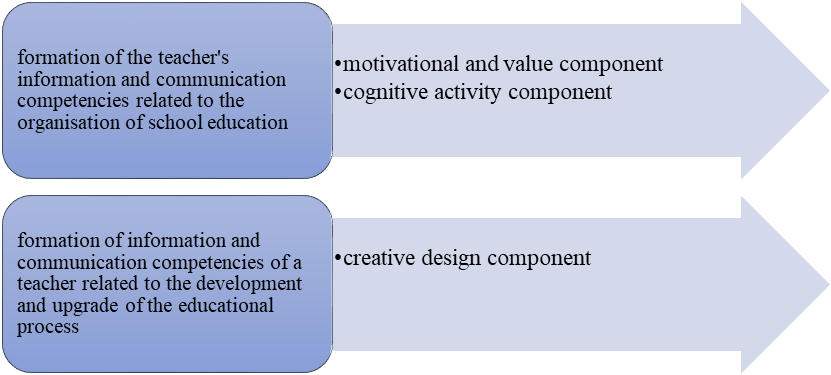
Source: by N. Yu. Goncharova, A. I. Tymoshenko
The analysis of these works made it possible for us to identify the following structure of general indicators of digital competence, by means of which it is supposed to monitor the effectiveness of digital competence mastering and the proficiency degree of compulsory general education teachers (Figure 2).
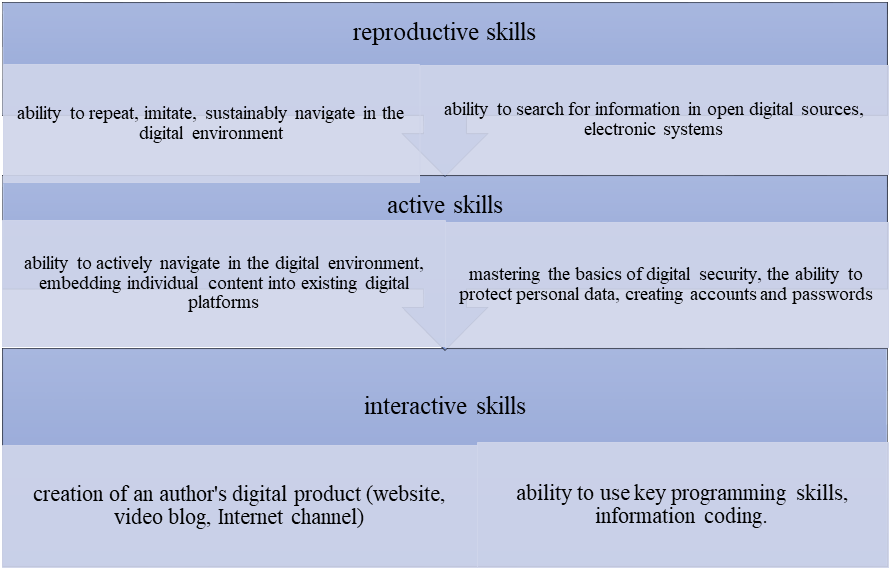
In foreign studies, Kaigorodova (2020) notes that, in general, teachers lack digital literacy, but at the same time, experienced teachers have a desire to use digital technologies in teaching.
Researchers identify 7 aspects of professional digital competence of teachers: 1) technological competence, 2) knowledge, 3) attitude to the use of technology, 4) pedagogical competence, 5) cultural awareness, 6) critical approach, 7) professional involvement, emphasising the special importance of technological and pedagogical competencies (Skantz-Åberg et al., 2022).
According to Novella-Garcia and Cloquell (2021) despite the presence of digital competencies in the curricula, including the subject related to the study of information and communication technologies, the ethical aspect is presented only in one fifth of the curricula, which allows us to conclude that there is insufficient training of future teachers in the field of ethics of digital competencies.
Falloon (2020) focuses on the need to have the knowledge and skills to carry out ethical, safe and productive functioning in diverse, digitally mediated environments (Falloon, 2020).
Hence, the analysis of scientific and methodological approaches to this problem allows us to conclude that it is necessary to systematically monitor the digital competence of a teacher in order to identify the level of his/her digital literacy and overcome the lack of digital skills.
Problem Statement
The aims of the paper were the following:
- to define the level of digital competence of compulsory general education teachers;
- to outline the prospects for an increasing competence level.
Research Questions
The following research questions were raised:
- to analyse the modern specifications of the organisation of the digital educational environment for the compulsory general education teachers;
- to conduct an experimental assessment of pedagogical conditions that allow to analyse the digital competence of compulsory general education teachers.
Purpose of the Study
Purpose of the Study was to classify and systematise the key indicators of digital competence within the monitoring system of the competence mastering by compulsory general education teachers.
Research Methods
The methodological prerequisites of the research were the modern scientifical perspectives on the principles of continuous professional development, the social creative nature of the individual, the creativity and the identity; scientific findings meant to improve the professional competencies of teachers; environmental approach within the digitalisation of education.
The theoretical and empirical research methods were used in the study. Theoretical methods: analysis and systematisation of psychological and pedagogical research in the field of digital development of learning space; general theoretical methods of analysis, synthesis. Empirical methods: study and generalisation of pedagogical experience on the research problem, conceptualisation of educational practice, questionnaires, statistical data processing.
Findings
The research results were based on the data of the survey ”Digital literacy of a teacher”, carried out in April 2022 in a number of schools in Yelets: Municipal state funded educational institution “Gymnasium No. 97”, Municipal state funded educational institution “Gymnasium No. 11”, Municipal state funded educational institution “Secondary School No. 1 named after M. M. Prishvin”, Municipal state funded educational institution “Lyceum No. 5”, Municipal state funded educational institution “Secondary School No. 24”, Municipal state funded educational institution “Secondary School No. 8” and others. 250 secondary and high school teachers of compulsory general education institutions (grades 5-11) took part in the anonymous survey.
The occupational standard of a teacher, put into effect in 2013, requires teachers of primary, secondary and high school to possess competencies related to information and communication technologies (ICT): general-use, general-pedagogical, subject-pedagogical, taking into account orientation to the professional field of activity (Order of the Ministry of Labor and Social Protection of the Russian Federation N 544n “On the approval of the occupational standard “Teacher (pedagogical activity of preschool, primary, secondary, high school teachers of compulsory general education) (educator, teacher)”, 2013). Therefore, in the occupational standard, which is a document verifying the conformity of the labor functions formation, there is no concept of “digital competence”, however, the qualification indicators of the requirements for a teacher indicate the need to master digital competencies.
At the legislative level, the concept of a digital educational environment has been introduced, which is being implemented as an experiment on a voluntary basis in a number of state and municipal educational organisations. The two-year pilot projects should be completed by 31 December 2022. The digital educational environment implies such an organisation of the learning process with the use of electronic resources, services and technologies, when all conditions are created for the mastering of the educational program by all students, regardless of their place of residence. The means of implementation are the following: e-learning, distance learning technologies that take into account work in an electronic information and educational environment, which is understood as "electronic information and educational resources and services, digital educational content, information and telecommunication technologies, technological means" (Government Resolution of the Russian Federation No. 2040 "On conducting an experiment on the introduction of digital educational environment”, 2020).
In the professional occupational standard of a teacher, within the framework of the general pedagogical function and training, mastering of ICT competencies is required, that is, regardless of the subject taught, teachers should be able to successfully implement this work function. In the context of the digital transformation of educational organisations, the digital competence of teachers, which allows modeling the educational process with the help of digital technologies, is of top priority.
The structure of digital competence can be clearly represented in the figure (Figure 3).
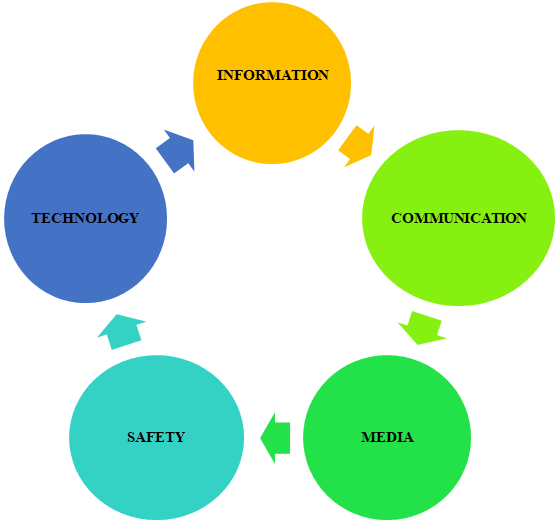
To determine the digital competence of compulsory general education teachers in the present-day conditions, the respondents were asked to answer a number of questions aimed at identifying reproductive, active and interactive skills, including knowledge and ability to work with information in the Internet environment, skills of communication with the use of digital technologies, ability to ensure safety when working in an electronic environment, the ability to create educational content (Figure 4).
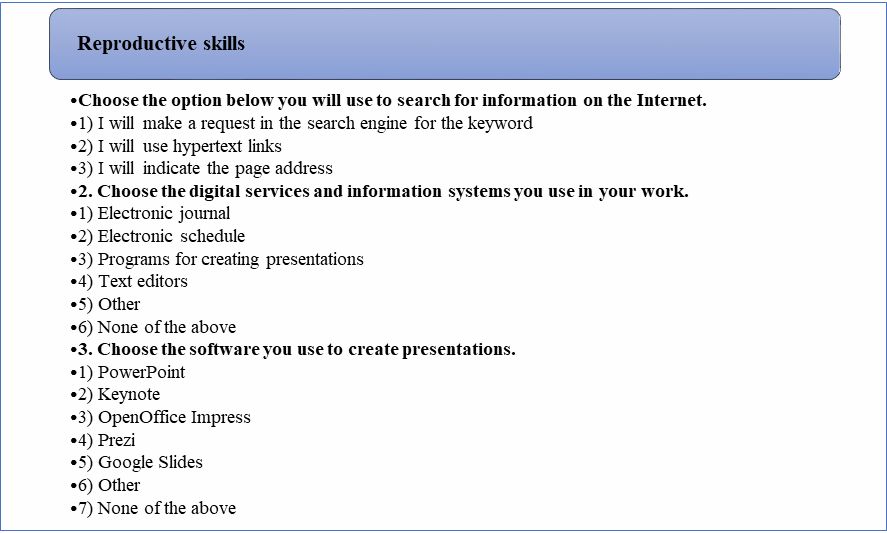
All respondents were divided into 3 groups, depending on the professional area of their pedagogical activity. The findings show that almost all participants of the experiment in educational work use digital tools as a channel of communication with all participants of educational relations. The level of digital security is higher among teachers of natural science subjects, they demonstrate confident skills of processing media resources and introducing new technologies into the educational process. However, in general, the formation of information security skills is 3.3 points on a five-point scale, and this causes certain risks in the development of the digital educational space. The problem of the reliability of the source remains at about the same level. The degree of mastery of digital media designers remains low (2.9 points), teachers mostly use ready-made multimedia products, and do not create their own models (Figure 5).
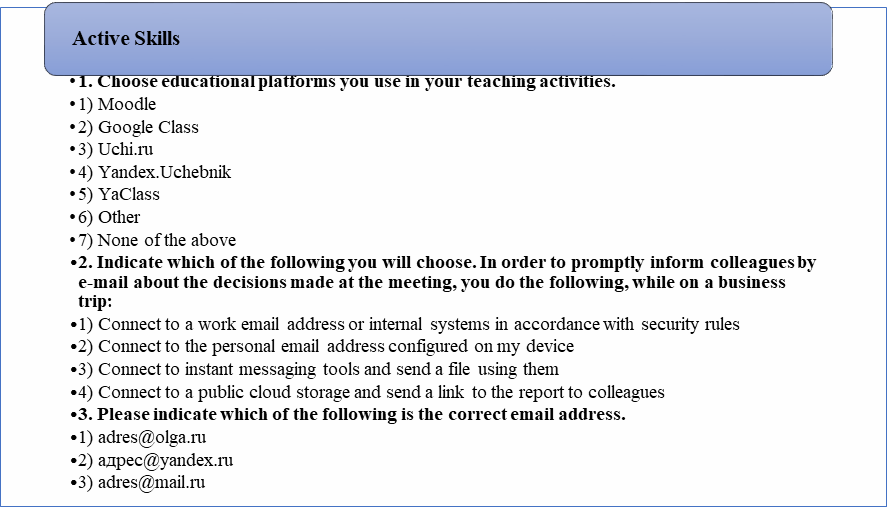
In order to form, maintain and improve the digital competence of compulsory general education teachers in the present-day conditions of modern challenges and risks, it is necessary to pay special attention to the development of media literacy for a better and more fruitful performance in the digital environment.
Conclusion
To sum everything up, the results of the study indicate a sufficient level of compulsory general education teachers' competence in a digital educational environment. The success of improving the professional competence of teachers in a digital educational environment largely depends on the efficient interaction between students and teachers, continuous learning, the availability of a motivational sphere to achieve success, the digital culture of teachers and schoolchildren.
The study shows that teachers need to increase the level of digital competence. A variety of activities in which teachers are included contribute to their personal and professional growth, self-knowledge and the development of their potential abilities.
The analysis of the data obtained makes it possible to suggest that the mastery of digital competence by compulsory general education teachers in a digital educational environment largely depends on the organisation of the educational process, independence in individual work on a computer, the ability to evaluate their actions when solving any tasks, a comfortable environment of an educational institution.
Acknowledgments
We express our gratitude to the Rector's Office of the I. A. Bunin Yelets State University for supporting the research.
References
Avdeeva, S. M., Uvarov, A. Y., & Tarasova, K. V. (2022). Cifrovaya transformaciya shkol i informacionno-kommunikacionnaya kompetentnost' uchashchihsya [Digital transformation of schools and information and communication competence of students]. Voprosy obrazovaniya, 1, 218-243.
Babaev, D., Saipidinova, B., Babaeva, A., Alieva, B., & Abdullaeva, Z. (2020). Information and Communicative Competence Development in Prospective Teachers. Creative Education, 11, 2867–2875.
Baklanova, G. A. (2016). Ob ispol'zovanii cifrovyh obrazovatel'nyh resursov uchitelyami nachal'noj shkoly [About the use of digital educational resources by primary school teachers]. Mir, nauki, kul'tury, obrazovaniya, 6(61), 116-118.
Boronenko, T. A., & Fedotova, V. S. (2020). Cifrovoe nastavnichestvo: gotovy li uchitelya uchastvovat' v formirovanii cifrovoj gramotnosti shkol'nikov? [Digital mentoring: are teachers ready to participate in the formation of digital literacy of schoolchildren?] Yaroslavskij pedagogicheskij vestnik, 4(115), 33-44.
Deryabin, A. A., Fighters, I. E., Popov, A. A., Rabinovich, P. D., & Zavodensky, K. E. (2021). Issledovanie predstavlenij direktorov rossijskih shkol o cifrovyh kompetenciyah uchastnikov obrazovatel'noj sistemy [A study of the ideas of Russian school principals about the digital competencies of participants in the educational system]. Voprosy obrazovaniya, 3, 212-236.
Dyakova, E. A., & Sechkareva, G. G. (2019). Cifrovizaciya obrazovaniya kak osnova podgotovki uchitelya XXI veka: problemy i resheniya [Digitalisation of education as a basis for teacher training of the XXI century: problems and solutions]. Vestnik Armavirskogo gosudarstvennogo pedagogicheskogo universiteta, 2, 24-36.
Falloon, G. (2020). From digital literacy to digital competence: the teacher digital competency (TDC) framework. Educational Technology Research and Development, 68.
Goncharova, N. Y., & Timoshenko, A. I. (2009). Informacionno-kommunikacionnaya kompetentnost' pedagoga kak integrativnyj pokazatel' professionalizma v sovremennyh usloviyah [Information and communication competence of a teacher as an integrative indicator of professionalism in modern conditions]. Sibirskij pedagogicheskij zhurnal, 3, 75–85.
Government Resolution of the Russian Federation No. 2040 "On conducting an experiment on the introduction of digital educational environment”. (2020, December 7). The GARANT system. https://base.garant.ru/75022819/
Gryaznov, S. A. (2021). Cifrovaya kompetentnost' prepodavatelya [Digital competence of the teacher]. Azimut nauchnyh issledovanij: pedagogika i psihologiya, 10, 2(35), 79–81.
Ignatiev, V. P., Ivanov, A. S., & Ivanova, M. D. (2020). IKT-kompetentnost' pedagoga kak osnova cifrovoj gramotnosti obuchayushchihsya [ICT competence of a teacher as the basis of digital literacy of students]. Sovremennye problemy nauki i obrazovaniya, 2, 56.
Kaigorodova, O. V. (2020). Obzor problemy IKT-kompetentnosti uchitelej v zarubezhnyh nauchnyh issledovaniyah [Review of the problem of ICT competence of teachers in foreign scientific research]. Kaliningradskij vestnik obrazovaniya, 4(8), 15-23.
Krylova, N. P., Antropova, L. V., & Levashov, E. N. (2019). Vliyanie organizacionnyh, ekonomicheskih i social'no-pedagogicheskih uslovij na cifrovizaciyu obrazovatel'noj sredy [The influence of organisational, economic and socio-pedagogical conditions on the digitalisation of the educational environment]. Science for Education Today, 4, 124–143.
Novella-Garcia, C., & Cloquell, A. (2021). The ethical dimension of digital competence in teacher training. Education and Information Technologies, 26, 1–13.
Order of the Ministry of Labor and Social Protection of the Russian Federation No. 544n “On approval of the professional standard “Teacher (pedagogical activity in the field of preschool, primary general, basic general, secondary general education) (educator, teacher)". (2013, October 18). The GARANT system. https://base.garant.ru/70535556/
Pesha, A. V. (2022). Razvitie cifrovyh kompetencij i cifrovoj gramotnosti v XXI veke: obzor issledovanij [The development of digital competencies and digital literacy in the XXI century: a review of research]. Obrazovanie i samorazvitie, 17(1), 201–220.
Skantz-Åberg, E., Lantz-Andersson, A., Lundin, M., & Williams, P. (2022). Teachers’ professional digital competence: an overview of conceptualisations in the literature. Cogent Education, 9. https://doi.org/10.1080/2331186X.2022.2063224
Copyright information
-
About this article
Publication Date
30 December 2022
Article Doi
eBook ISBN
978-1-80296-959-7
Publisher
European Publisher
Volume
3
Print ISBN (optional)
-
Edition Number
1st Edition
Pages
1-245
Subjects
Education, educational psychology, pedagogy, positive pedagogy, special education, second language teaching
Cite this article as:
Kotlyarova, O. A., Povalyaeva, O. N., & Turko, U. I. (2022). Digital Competence of Compulsory General Education Teachers in thePresent-Day Conditions. In A. Güneyli, & F. Silman (Eds.), ICEEPSY 2022: Education and Educational Psychology, vol 3. European Proceedings of International Conference on Education and Educational Psychology (pp. 164-173). European Publisher. https://doi.org/10.15405/epiceepsy.22123.14

